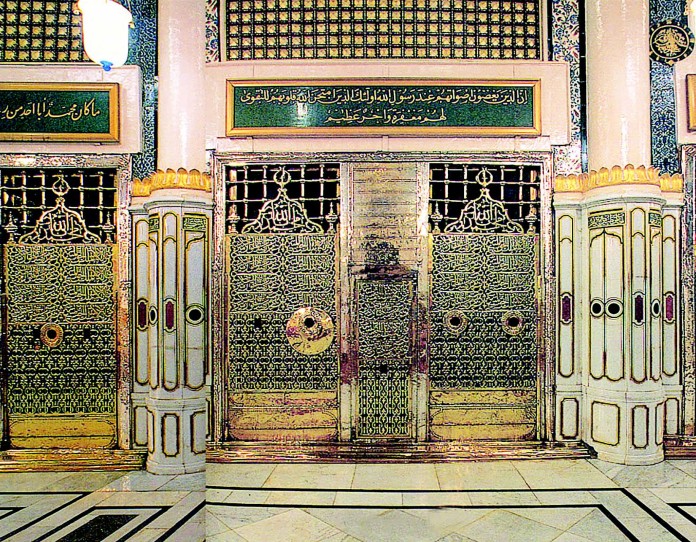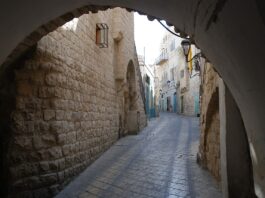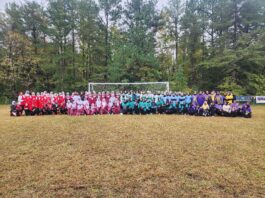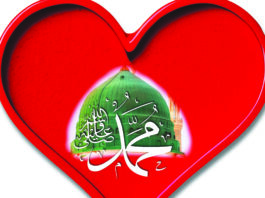The most comprehensive hilye (artistic and poetic description) text is found in Ash-Shifa, the great work on the Holy Last Messenger (peace and blessings be upon him) by Al-Qadi Iyad (d. 1149). Here it is, in its fullest version:
Al-Hassan, son of H. Ali (may Allah be pleased with both of them) said, “I asked my uncle, Hind, son of Abu Hala about the hilye of the Holy Last Messenger, (may peace and blessings be upon him).” Hind was known to be a prolific describer of the Holy Last Messenger, (peace and blessings be upon him) and I wished him to relate some of it for me, so I might hold fast to it.
So Hind said, “The Holy Last Messenger, (peace be upon him), was of mighty significance to Allah and profoundly honored among the people. His face radiated light like the moon on its fullest night. He was a bit taller than the medium stature and a bit shorter than the tall and skinny. His head was large, his hair was wavy. If his hair parted, he would leave it parted; if not, he would leave it, and it would not be long enough to pass his earlobes. His complexion was fair. He had a wide forehead and arched, thick eyebrows with a space between them. There was a vein between them that would swell and pulse when he was angry. His nose was aquiline; it had a brightness about the upper part that led those who were less observant to think him haughty. He had a thick beard. His eyes were very black and the whites very white. His cheeks were not prominent. He had a wide mouth. His teeth were white, and there was a space between his front teeth.
“There was a fine line of hair on his chest, and it was as if it were an ivory statue with the purity of silver. His figure was well- proportioned, full-bodied, and strong. There was no slackness in his musculature; his chest didn’t protrude over his belly, nor did the reverse occur. His chest was broad and his shoulders wide and muscular. He had large limbs. The parts of his body that could be seen while he was clothed were luminous. His body from the neck to the navel was joined by hair which flowed down like a line. There was no hair on his nipples. His forearms, shoulders, and upper chest were hairy. The bones of his forearms were long. His palms were wide and generous. His hands and feet were thick. His limbs were long. He had long sinews. His insteps were high. His feet were smooth without protuberances, and water would run off of them. When he would move off, he would move with determination. He would step surely and unhurriedly and not proudly. He walked gently and with dignity, and he would take wide steps when he wanted to walk quickly. When he walked, it was as if he were descending from a slope, and when he would look at someone, he would turn to him fully. He would lower his gaze and look down more often than up. He didn’t stare. He would lead his companions by walking behind them out of modesty and would always be the first to greet them.”
At this point, Al-Hassan said to Hind, “Describe to me the way he spoke.”
Hind said, “The Holy Last Messenger, (peace and blessings be upon him), was continually full of concern. He was constantly deep in thought. He had no rest and would not speak without a reason. He would be silent for long periods of time. He would begin conversations and end them clearly and distinctly and would speak in a way that combined many meanings in few words. He spoke with excellence, and there was no excess in it or unnatural brevity. He was gentle by nature and not coarse, and he was not contemptuous of anyone. He would extol the favors he received even when they were few and small. He never found fault with them. He never criticized the food or drink that was prepared for him, nor did he overly praise it. No one would stand against his anger when matters of the Lord’s truth were opposed until he had triumphed, but he would never get angry for his own sake, nor would he ever seek to win such an argument. He would gesture with his whole palm, to point. When astonished, he would turn the face of his palm upwards. He used his hands frequently as he spoke and would strike his left palm with his right thumb. When he would get angry, he would turn away and avert his gaze, and when he was full of joy, he would lower his eyes. Most of his laughing was as smiling; when he did laugh, it was not loud, and he would show his teeth a bit like they were hailstones.”
Al-Hassan said, “I kept this report to myself, away from my brother, Al-Husayn, for awhile; then I told it to him, but he had already heard it and found out even more. He had asked our father, H. Ali, about the way the Holy Last Messenger, (peace and blessings be upon him), was when he was at home, was when he went out in his assemblies, and was concerning his living.” Al-Hasan left nothing of this out.
Al-Husayn said, “I asked my father, H. Ali, (may God be pleased with them both), about how the Holy Last Messenger, (peace and blessings be upon him), was at home.”
He, H.Ali (peace be upon him) said, “He always asked permission to enter his home, from Allah and from those within. When at home, he would divide his time into three parts: one part for Allah, one for his family, and one for himself. Then, he would divide his own portion between himself and the people. His elite companions would mostly share this time with him, and they would convey his words to the common people. He would hold nothing back from them, neither knowledge nor worldly things. It was his way to prefer the people of excellence according to their merit in religious matters. Among the people, there were those with a need, those with two needs, and those with many needs. He would work with them, and he would occupy them and the community in general with that which would improve their situations. This he would do by asking about them and their needs and by informing them what they ought to do. He would say, ‘Let the one who is present among you inform the one who is absent, and bring to me the need of he who is unable to tell me himself. Truly, on the Day of Judgment, Allah will make firm the feet of one who informs someone in authority of the need of someone who is unable to convey his need himself.’ This was the kind of topic mentioned in his presence, and he didn’t accept anything else from anyone, that is, he didn’t like meaningless conversation, and liked to talk about how to help people.” (To be continued in next issue.)




